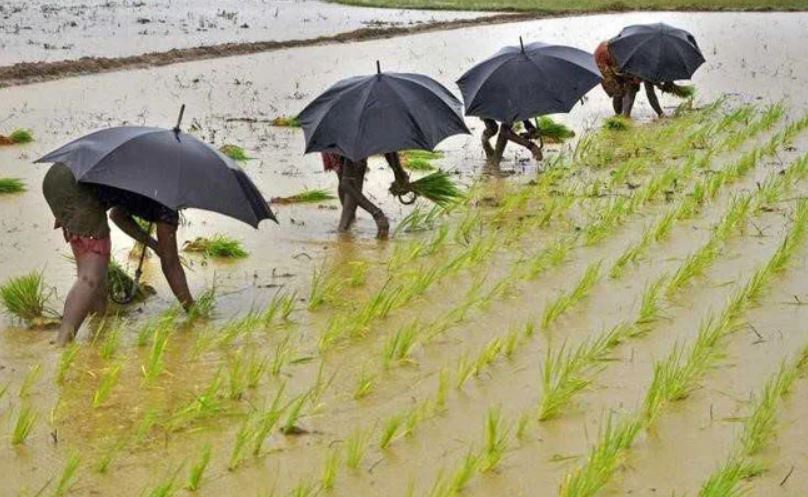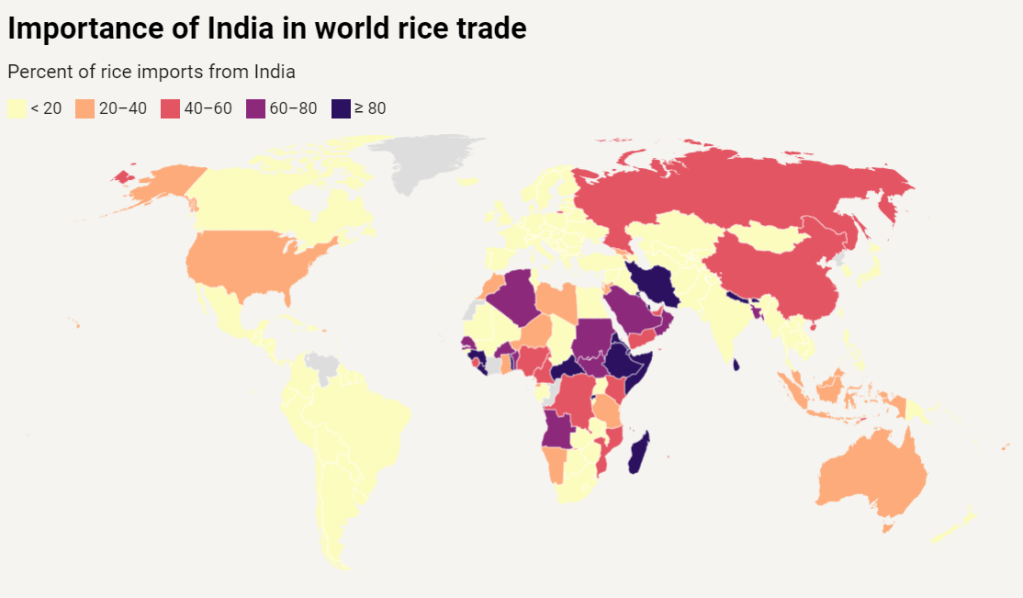India's rice export ban-Panic or Precaution?
- Anubhav Saha Roy

- Jan 3, 2024
- 4 min read
In a surprising and pivotal move, India, often regarded as the world's rice bowl, on July 20th, imposed a ban on the export of rice to foreign markets. Being the largest exporter of rice in the world, this decision sent a shockwave across global agricultural markets. It has raised questions and concerns amongst both domestic farmers and international trading partners.
India's stance as a leading rice exporter, with a whopping forty percent of global rice exports, has played a significant role in global food security, thus making this export ban a matter of international interest and scrutiny. As the nation wrestles with its own agricultural challenges, this unexpected development has cast a spotlight on the intricate web of factors that influence global food trade as well as the delicate balance between domestic needs and international obligations.
The primary reason for this ban was the shortage in supply due to untimely monsoons. Monsoons of India in recent years have been erratic. This year was no different. We could witness it firsthand. Much of the season here was completely dry but there were peculiar streaks where the grounds were turned to slush. Monsoons have long been a double-edged sword for the nation's agricultural landscape. Livelihoods of millions of farmers are dependent on the monsoons that bring much-needed rain to replenish reservoirs and irrigate fields. However, the predictability of rains has become increasingly uncertain. Prolonged dry spells followed by intense downpours have thrown planting and harvesting schedules completely out of whack. This year torrential rains in north India left newly planted saplings underwater, while much of south India was parched. Poor farmers are left to grapple with the challenges of adapting to a climate that no longer adheres to traditional and seasonal norms.

Due to aforementioned climate changes, the supply of rice has fallen well short of the demand in our country. Economic studies show that if supply doesn’t meet demand, price goes up. There now enters a political aspect into the equation. Since rice is an essential commodity, the central government is very sensitive to its price. If the price increases considerably, the common man tends to blame the government. Governments, wary of public sentiment and electoral outcomes, are thus hesitant to increase the prices of essential commodities. It is for this reason that analysts do not expect this ban to be lifted before the general elections that would be held in April next year.
This reluctance is often driven by a desire to shield citizens from the immediate impact of inflation and rising costs, thereby maintaining a favorable public image. However, such an extreme decision may have been a short-sighted one. The long-term repercussions can be complex, affecting the sustainability of subsidies, trade dynamics and India’s competitiveness in the export market. The central government's stance on essential commodity prices, therefore, reflects the intricate interplay between economic necessity and political imperatives, with ramifications that extend far beyond immediate electoral concerns.
Another important aspect that we must consider is how this ban affects our foreign relations and diplomatic standing. Such bans often disrupt established trade relationships and can strain ties with trading partners. Several nearby south-east Asian countries rely on India for rice imports. Especially, neighbors Nepal-our largest importer, Malaysia, Vietnam, Bangladesh and Singapore.

When a nation heavily depends on imports of essential commodities, sudden export bans lead to supply shortages and increased prices in importing countries, leading to frustration and resentment. In extreme cases, this can result in trade disputes, retaliatory measures, and even sanctions. Additionally, it may erode the trust and predictability that underpins international trade, making it more challenging to negotiate agreements and partnerships in the future. Thus, export bans on essential commodities highlight the intricate link between economic policies and diplomatic relations, necessitating careful consideration of their potential diplomatic repercussions.
The international rice market must be stabilized after this sudden shakeup. Importing countries must reduce their reliance on a single rice-exporting nation by diversifying their sources as well as building up strategic rice reserves. Sustainable farming practices globally can help increase rice production and negate the impact of erratic weather. Countries must also enhance and improve trade agreements that include provisions which can provide predictability for both exporting and importing nations. Such agreements should include safeguards to address similar abrupt export bans.

In conclusion, India's recent decision to impose a ban on rice exports has both short-term impacts as well as long-term consequences. While this move was driven by concerns over domestic food security and rising inflation, it could have significant repercussions on international trade and relations.
It forces nations to reconsider the way they have gone about relying on other countries for imports. The ban has also prompted a broader conversation about sustainable agricultural practices, as erratic monsoons continue to challenge India's food production. As the nation navigates these complex dynamics, it serves as a poignant reminder of the intricate web of factors that influence global food trade and the necessity for a sophisticated strategy to address the needs of both its domestic citizens and the international community.
-Anubhav Saha Roy



Comments